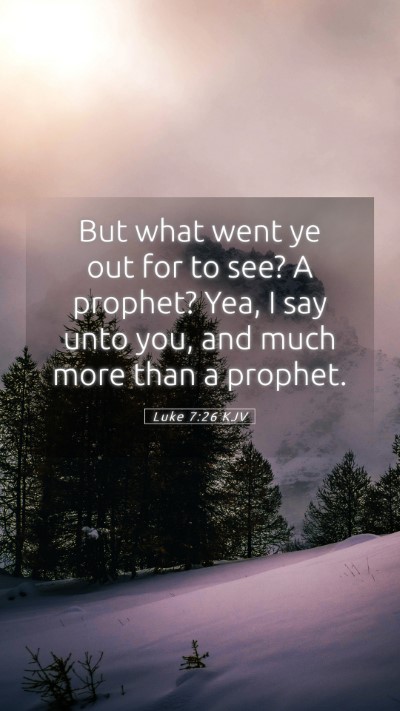Bible Verse Commentary on Luke 7:26
Luke 7:26 states: "But what went you out to see? A prophet? yea, I say unto you, and much more than a prophet." This verse is part of a passage where Jesus speaks of John the Baptist, highlighting his essential role and significance in God’s plan. The commentary on this verse offers profound insights into the understanding of John the Baptist's character and mission, enriching Bible verse interpretations.
Contextual Background
In the context of scripture, Jesus stands amidst a crowd that includes those who have been impressed by John the Baptist's ministry. The question posed directs their thoughts to the nature of John's prophetic vocation and challenges them to reflect on his true identity as more than just a prophet.
Interpretation of Key Elements
- John the Baptist's Role: John is recognized not merely as a prophet but as the herald of Christ, fulfilling the prophecies about the forerunner mentioned in the Old Testament (e.g., Isaiah 40:3).
- Prophecy and Authority: Jesus' statement establishes the authority John held and distinguishes him in a unique spiritual lineage, marking him as a pivotal character in the redemption narrative.
- Importance of Expectation: This verse prompts a reflection on what people expected to find in John’s ministry and how these expectations align with God's purposes.
Insights from Commentators
The analysis provided by Matthew Henry strongly emphasizes John's role as the last of the Old Testament prophets, a transition figure from the old covenant to the new. He notes that John’s ministry was characterized not only by his prophetic declarations but also by his lifestyle and commitment. Henry asserts that the people’s admiration of John reflects their recognition of divine purpose at work through him.
Albert Barnes adds that this question from Jesus invites the audience to consider their preconceived notions about prophets and challenges them to grasp John’s significance in the unfolding plan of God. Barnes highlights how Jesus elevates John’s status and indicates that he was indeed a messenger sent to prepare the way for the Messiah.
Adam Clarke expounds on the notion of what makes a prophet. He leads readers to understand that John’s prophecies were extraordinary due to their proximity to the fulfillment of messianic expectation. Clarke’s insights assist in comprehending the depth of John's mission in the broader biblical narrative.
Applications and Reflections
Luke 7:26 encourages believers to ask deep questions about their expectations of God’s servants and to recognize the uniqueness of God’s call on each life. How do our perceptions of leadership in faith align with biblical portrayals? Moreover, the understanding of John as “more than a prophet” pertains significantly to the nature of expectation in our own lives in relation to God's calling for us.
Cross References
- Malachi 3:1: This verse foretells the coming of a messenger that will prepare the way before the Lord.
- Isaiah 40:3: Identifies the voice of one calling in the wilderness, directly related to John’s mission.
- Matthew 11:9-11: Jesus also comments on John the Baptist’s role and significance, further expounding on his exceptional status among prophets.
Conclusion
In summary, the interpretation of Luke 7:26 is rich and multifaceted, having implications for our understanding of prophetic ministry and the unfolding of God's plan. Engaging with the insights provided by public domain commentaries enhances our study of this scripture while inviting deeper reflection and application in our lives today. This verse serves as a pivotal moment that encourages us to see biblical figures not merely as historical characters but as integral parts of our spiritual heritage, deserving of deep investigation and reverence.


